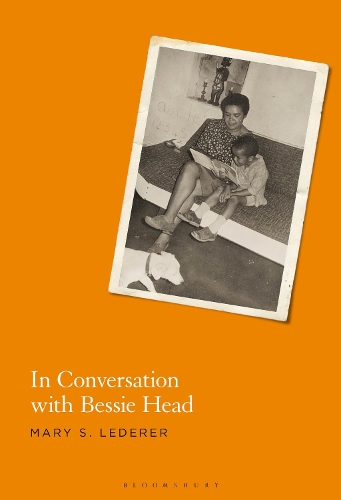
In Conversation with Bessie Head
(Hardback)
Publishing Details
In Conversation with Bessie Head
By (Author) Dr. Mary S. Lederer
Bloomsbury Publishing PLC
Bloomsbury Academic USA
27th June 2019
United States
Classifications
Tertiary Education
Non Fiction
Literary studies: fiction, novelists and prose writers
Literary theory
823.92
Physical Properties
Hardback
168
Width 152mm, Height 229mm
399g
Description
In Conversation with Bessie Head shows how reading the novels and letters of Botswana's most influential writer, Bessie Head, fosters an ongoing conversation between reader and writer and is in fact a very personal undertaking. Each chapter tackles two parallel threads, the first regarding Mary S. Lederer's own history of reading Headfrom her first purchase of Maru, through completing a Ph.D. on Head's trilogy, through living in Botswana and connecting with various aspects of Head's life, to examining how reading Head has affected her own development as a human being. This history then ties each chapter into discussion of how Head develops her own vision of the brotherhood of man. Alongside critically informed discussion, Heads vision is examined through the prism of specific questions. Why is madness not a useful concept for understanding Heads ideas Why did Head say she was not a feminist, and what is the significance of male and female in her novels What is the relationship between individual, race, and community How can the nature of God be a clear expression of love but also an indistinct force for both good and evil Head's novels present opportunities for personal growth, and through these conversations with her, we become different readers.
Reviews
Mary S. Lederer reflects on what [Bessie} Head taught her, how Head has changed her, even on what Head might think of her. Diverging from the typical scholarly mode, she takes an analytical approach we might call devotional criticism; for Lederer, Heads work is not a neutral subject of study but a source of wisdom, both secular and spiritual. In its analytic timeline, the book uniquely configures questions of aging and literary analysis. When one reads a text at 20-something, how is it different than reading it at 40-something or 60-something How do we evolve as academics, as family members, as global citizens, and as human beings in relation to the books we read Compounded over time, what does literature do to us This is an original angle, which will resonate with many of Heads readers. Ultimately, this book serves as a reminder of why we love literature in general and Bessie Head in particular, and it opens a space to speak from that feeling without neglecting rigor. * Megan Cole Paustian, Journal of the African Literature Association *
Very few writers are able to infuse an academic piece of writing with the right balance of emotion and objective content. Mary Lederer is one such writer. Her latest engagement with Bessie Head is both a personal journey with an iconic writer and an insightful work about an individual who still intrigues us more than thirty years after her death This gem of a book carries a lot of new insights into Bessie Head as a writer, but more importantly of Bessie Head as a person As a conversation, the book already sets the tone for the type of writing that it is. This is a journey for the reader as much as it is for the writer and it is easy for one to finish it in one sitting without being exhausted by the analysis. * Wahza Lopang, Botswana Notes and Records *
In Conversation with Bessie Head is a response to Bessie Heads lifelong rejection of any form of labelling. Mary Lederer addresses Heads confrontation with the restrictive nature of power by emphasising that a reader who is willing to open up to her texts does not gain mastery of them, but rather self-insight. In an interplay between Heads voice and her own subjective and varying reader responses, Lederer moves to the core of Heads philosophy and unfolds the many layers of her writing. The extensive use of quotations enhances the conversational element. * Gillian Stead Eilersen, author of Bessie Head: Thunder Behind Her Ears (1995) *
In Conversation with Bessie Head is an intense, movingand sometimes maddeningengagement with an elusive author. But it stays remarkably faithful to the Bessie Head with whom I worked and struggled, especially in its evocations of Bessie's deeply felt spirituality. This radical recasting of the Head mystiqueat once personal and scholarlyis a boon and a challenge to Bessie's many devoted readers. * Tom Holzinger, writer and Bessie Head confidant *
Author Bio
Mary S. Lederer is an editor and independent scholar based in Gaborone, Botswana, and was formerly Senior Lecturer in African Literature at the University of Botswana. She is the author of Novels of Botswana in English, 1930-2006 (2014).
